(Created page with "{{regelman01a}} {{wtps}} <center><wz tip="">650px</wz></center> Auto- and cross-correlations in a multiexcitonic quantum dot ...") |
m |
||
| Line 28: | Line 28: | ||
They provide the famous (Carmichael) solution for $N=1$: | They provide the famous (Carmichael) solution for $N=1$: | ||
| − | <center><wz tip="">[[File: | + | <center><wz tip="">[[File:Screenshot_20240724_181127.png|400px]]</wz></center> |
On the asymmetry of the cascade: | On the asymmetry of the cascade: | ||
Revision as of 16:11, 24 July 2024
Semiconductor Quantum Dot: A Quantum Light Source of Multicolor Photons with Tunable Statistic. D. V. Regelman, U. Mizrahi, D. Gershoni, E. Ehrenfreund, W. V. Schoenfeld and P. M. Petroff in Phys. Rev. Lett. 87:257401 (2001). What the paper says?
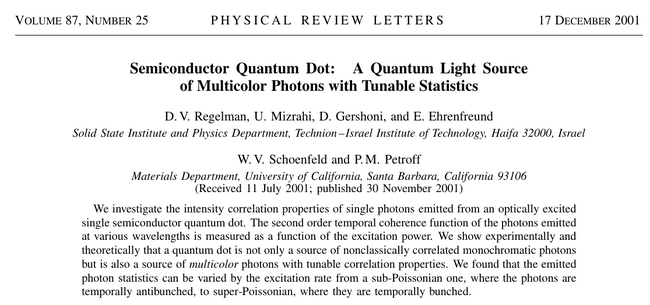
Auto- and cross-correlations in a multiexcitonic quantum dot cascade are studied (they say they have «measured for the first time temporal correlations between photons of different colors»). At low power, only the exciton ($X^0$) is observed, and it is antibunched. Increasing power, new lines $nX^s$ are reported and cross-correlated to the exciton.
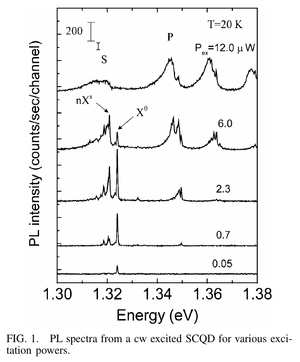
This gives a very beautiful characterization neatly summarized in their Fig. 2:
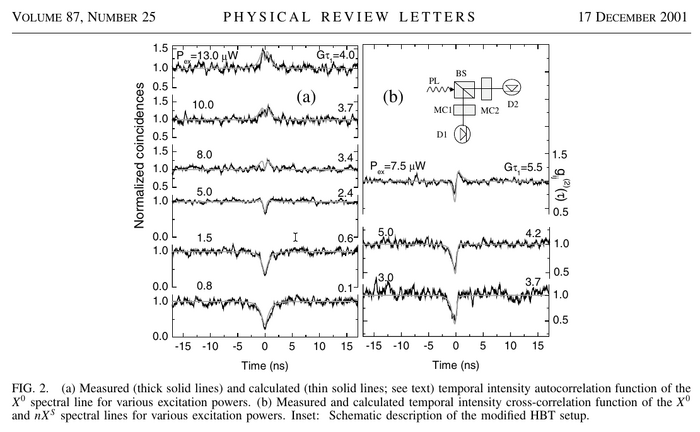
They use rate equations from previous papers.[1][2] Specifically here, they solve:

They find the steady-state exactly and the formal form of the transients:
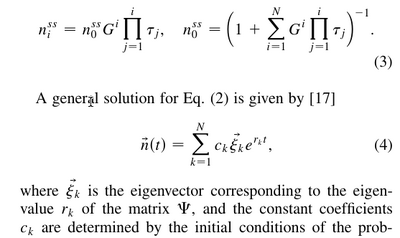
This allows them to compute $g^{(2)}$ from the population conditioned to its initial condition. They say that they solve the equation analytically, although they don't give details or explicit results:
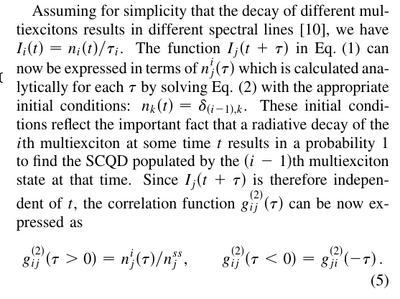
There, $n_j^i(\tau)$ seems to be the solution for the $j$th probability conditioned on the $i$th one. The validity of this procedure is a bit unclear.
$n_0(t)$ is the probability for the QD to be empty. $G$ is the pumping rate which they call "the cw e-h pairs photogeneration rate." Importantly, it links all successive steps in the cascade. $\tau_i$ are the $i$th multiexciton decay times, so that although it appears in the equation (for symmetry and/or elegance), $\tau_0=\infty$.
They provide the famous (Carmichael) solution for $N=1$:

On the asymmetry of the cascade:
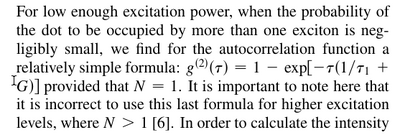
References
- ↑ Cascade evolution and radiative recombination of quantum dot multiexcitons studied by time-resolved spectroscopy. E. Dekel, D. V. Regelman, D. Gershoni, E. Ehrenfreund, W. V. Schoenfeld and P. M. Petroff in Phys. Rev. B 62:11038 (2000).
- ↑ Carrier-carrier correlations in an optically excited single semiconductor quantum dot. E. Dekel, D. Gershoni, E. Ehrenfreund, J. M. Garcia and P. M. Petroff in Phys. Rev. B 61:11009 (2000).